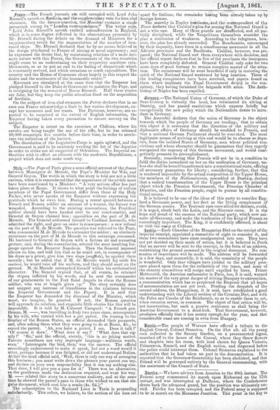fermaq.—The National Union of Germany, of which the Duke of
Saxe-Coburg is virtually- the head, has terminated its sitting at Dantzig, and has passed resolutions which express briefly but energetically the new policy which the Nationalists desire to intro- duce in Germany.
The Assembly declares that the union of Germany is the object towards which the people of Germany are tending; that to obtain this object it is necessary that the direction of the military and diplomatic affairs of Germany should he confided to Prussia, and that a national German Parliament should be convoked. The most legitimate means of arriving at this end would be to choose as depu- ties, from the isolated States of Germany, men whose political con- victions and whose character should be guarantees that they eagerly recognized the urgency of this German movement, and would ener- getically promote its accomplishment.
Secondly, considering that Prussia will not be in a condition to fulfil, the duties incumbent on her on the unification of Germany, un- less she shall be herself transformed into a constitutional state, offering all necessary guarantees for liberty; considering, further, that this is rendered impossible by the actual composition of the Upper House, the members of the Nationalverein, assembled at Dantztg, declare that a radical transformation of the Upper House is the principal object which the Prussian Government, the Prussian Chamber of Deputies, and the Prussian people, ought to pursue by all constitu- tional means.
It is believed to be one of the ideas of this party to consider Eng- land a Germanic power, and her fleet as the fitting complement of the German armies. The Teutonic race once allied for defence, could, it is urged, check both the Latin, and the Slavonic races. It is the hope and dread of the success of the National party, which now ani- mate all Germany, and make the tendencies of the King of Prussia so exceedingly important. The King, it is confidently affirmed, is about to visit the camp at Chalons.






























 Previous page
Previous page